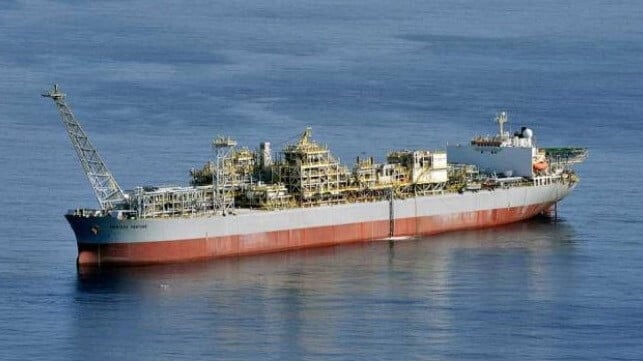Montara FPSO off Australia Resumes Operation After Six-Month Shut Down

More than six months after they were forced to shut down production on the Montara Venture FPSO offshore Australia, Jadestone Energy reports the vessel resumed production on March 21. The vessel, which is now 33 years old, faced numerous delays and challenges in the restart process that began with what was originally reported to be a small leak in the late spring of 2022.
According to Jadestone, in a carefully planned restart program, production recommenced from the H6 well on the Montara field, with further wells to follow, including the first Skua subsea well which will be brought online in the coming days. They expect that production rates will increase with the systematic opening of additional wells in line with the company’s restart plan. However, they have deferred from issuing production guidance for 2023 until Montara’s output is stabilized.
“I would like to thank everyone in Jadestone who has contributed to the safe and successful restart of Montara operations as we look forward to putting this challenging period behind us and returning to business as usual,” said Paul Blakeley, President and CEO of Jadestone. “It is a relief to see operations at Montara being restored and we look forward to increasing production and cash flow.”
Production began in 2010 at the site which is approximately 400 miles west of Darwin in the Timor Sea with an estimated reserve of 24 million barrels. It is centered around the FPSO Montara which was converted from a 146,000 dwt tanker, Freeway, by Tanker Pacific in 2009 in Jurong Shipyard. At the time they said the conversion was designed to provide a minimum of 20 years without dry docking. The Montara Project was acquired by Jadestone in September 2018.
The most recent problems started in June 2022 when a small leak of oil from one of its tanks was detected. Jadestone completed an interim repair and subsequent restart of production, while they were working on a permanent repair to the tank. During preparations for that repair, an additional internal defect in a water ballast tank was also identified, which also required repairs. Initially, the company said it was suspending production through September 2022 with the costs of repairing the vessel expected at $2 to $4 million. They said switching the production teams for maintenance staff would facilitate a quicker resumption but later experienced problems associated with weather and delays in obtaining materials.
Australia’s National Offshore Petroleum Safety and Environmental Management Authority however in mid-September issued a general direction to the company, which requires that Jadestone engage an independent reviewer to undertake a gap recognition review and assure Jadestone’s remediation plans and operational readiness before the restart of production operations. The regulators, which said they had already been monitoring the site, announced they would also review the independent reviewer’s report before the restart of production through the FPSO.

that matters most
Get the latest maritime news delivered to your inbox daily.
It took the company till January 2023 to complete and submit DNV’s independent review of Jadestone’s remediation plans and operational readiness for the Montara Venture FPSO to the regulators. At the time they also reported that hull and tank repair activity and the scheduled four-yearly planned topsides maintenance activities on the Montara Venture FPSO were progressing well, with operational readiness and production restart still targeted to occur later in February 2023. By early February, the general direction was closed but the company continues to experience delays including weather-related issues.
Moving toward the restart operation, Jadestone reported in mid-March they had encountered yet another delay. While performing necessary testing on process equipment during restart activity, the company said a small number of inconsistencies in standard fittings were identified and were being rectified to ensure safe operation.
